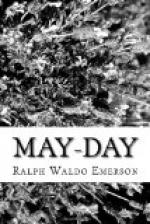One musician is sure,
His wisdom will not fail,
He has not tasted wine impure,
Nor bent to passion frail.
Age cannot cloud his memory,
Nor grief untune his voice,
Ranging down the ruled scale
From tone of joy to inward wail,
Tempering the pitch of all
In his windy cave.
He all the fables knows,
And in their causes tells,—
Knows Nature’s rarest moods,
Ever on her secret broods.
The Muse of men is coy,
Oft courted will not come;
In palaces and market squares
Entreated, she is dumb;
But my minstrel knows and tells
The counsel of the gods,
Knows of Holy Book the spells,
Knows the law of Night and Day,
And the heart of girl and boy,
The tragic and the gay,
And what is writ on Table Round
Of Arthur and his peers,
What sea and land discoursing say
In sidereal years.
He renders all his lore
In numbers wild as dreams,
Modulating all extremes,—
What the spangled meadow saith
To the children who have faith;
Only to children children sing,
Only to youth will spring be spring.
Who is the Bard thus magnified?
When did he sing, and where abide?
Chief of song where poets feast
Is the wind-harp which thou seest
In the casement at my side.
AEolian harp,
How strangely wise thy strain!
Gay for youth, gay for youth,
(Sweet is art, but sweeter truth,)
In the hall at summer eve
Fate and Beauty skilled to weave.
From the eager opening strings
Rung loud and bold the song.
Who but loved the wind-harp’s note?
How should not the poet doat
On its mystic tongue,
With its primeval memory,
Reporting what old minstrels said
Of Merlin locked the harp within,—
Merlin paying the pain of sin,
Pent in a dungeon made of air,—
And some attain his voice to hear,
Words of pain and cries of fear,
But pillowed all on melody,
As fits the griefs of bards to be.
And what if that all-echoing shell,
Which thus the buried Past can tell,
Should rive the Future, and reveal
What his dread folds would fain conceal?
It shares the secret of the earth,
And of the kinds that owe her birth.
Speaks not of self that mystic tone,
But of the Overgods alone:
It trembles to the cosmic breath,—
As it heareth, so it saith;
Obeying meek the primal Cause,
It is the tongue of mundane laws:
And this, at least, I dare affirm,
Since genius too has bound and term,
There is no bard in all the choir,
Not Homer’s self, the poet sire,
Wise Milton’s odes of pensive pleasure,
Or Shakspeare, whom no mind can measure,
Nor Collins’ verse of tender pain,
Nor Byron’s clarion of disdain,
Scott, the delight of generous boys,
Or Wordsworth, Pan’s recording voice,—
Not one of all can put in verse,
Or to this presence could rehearse,
The sights and voices ravishing




